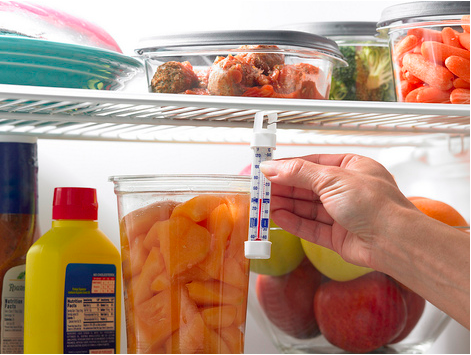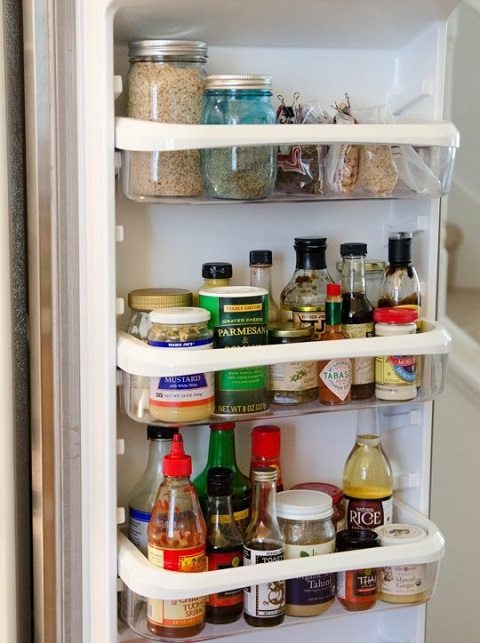How to arrange food in the refrigerator to keep it longer
Improperly arranging food in the refrigerator is one of the main causes of fast food failure and weakening of the refrigerator's ability.
Instructions on how to arrange and store food in scientific refrigerators
For the temperature in the refrigerator

Cabinet temperatures from 0ºC and 4ºC are the perfect temperature to keep the refrigerator from growing bacteria and preserving food longer.
For refrigerator roof
If possible, it is best to keep the refrigerator's roof clean and airy because all the hot air of the refrigerator is released from the top of the refrigerator. Therefore, to keep your refrigerator cooler, you should avoid superimposing the furniture and special food on top of the cabinet.
However, if your kitchen space is quite narrow, you can use the fridge to store some cooking books or some gentle kitchen tools.
For cabinet part

The cabinet is always the hottest part of the refrigerator, so this is the place reserved for products with natural preservatives that can keep them from being damaged like mayonnaise, chili sauce or fruit juice ., while the others others like eggs and dairy products are not the right place.
For the shelves above
These shelves have the most suitable temperature for storing foods without having to be processed like cooked or re-cooked meat, leftovers, drinks or instant foods.
For the lower shelves

Lower shelves are places with colder temperatures with other parts , so this is also the best place for eggs, dairy products, meat and seafood.
For dairy products you should close them when stored in the cabinet. For products like meat and seafood, you should wrap it in glossy paper, place it in a bowl or on a plate to keep it fresh and prevent the bacteria from spreading to other areas.
For drawer section

If there are two or more drawers or in drawers divided into sections, you should separate the fruits and vegetables separately. Many fruits, including peaches, plums and pears in the cabinet, often emit a kind of vapors that can quickly develop decay of vegetables.
For freezer section
This is in fact not just a place to store fresh, frozen food but also can contain foods such as bone broth, pasta sauce, corn cakes and even eggs but with conditions they must be packed tightly.

It's best to store all in a plastic container or cooler before putting it in the freezer.
For special foods
Eggs : because of the porous shell, eggs can absorb the smell of things around them. So if you have a bad smell in your refrigerator or have too many mixed foods, it is very difficult to keep eggs long, if you do not put them in a sealed container or pack them.

Champagne : A new study suggests that storing champagne in the refrigerator compartment of a refrigerator, at a temperature of 4ºC, will prevent the development of a color-causing compound that causes wine to fail.
Nuts and vegetable oils : Products made from nuts and vegetable oils can be kept in the refrigerator to maintain freshness and to last longer.
For foods that should not be refrigerated
Bread: Leaving bread in the refrigerator is a common mistake because bread will be dry. Unless you want to keep them for 3 months, you can pack them up and store them in the freezer.

Tomatoes : Tomatoes are easy to break down if left at room temperature but will become friable and lose smell if left in the refrigerator.
Onions, pumpkins and potatoes: For these foods you should store them in the kitchen cabinet because of the darkness and the low humidity will keep them longer than in the refrigerator.
General advice on how to put food in the refrigerator
A refrigerator like a miniature grocery store in the family will be convenient and attractive, but you should not cram everything you can into the cabinet. Cold air should be circulated in the cabinet and of course this air flow will be hindered when there are too many items.

If you don't pack food so neatly and scientifically, it is likely that food will be faster than you leave it outside.
For food in tin-plated boxes or boxes made of metal, you should not store them in the refrigerator when not in use because the food can react with these metals and lead to very fast deterioration.
Cleaning the refrigerator once a month will also help prevent the accumulation of bacteria and unpleasant odors in the cabinet.
- Do you really know how long we can keep the foods in the refrigerator?
- The food you should not store in the refrigerator
- Who created the refrigerator?
- The Dutch company invented an underground refrigerator without electricity
- Should I wait for cold food to be put in the refrigerator?
- Never put these foods in the refrigerator
- 'Consecutive' refrigerator
- Tips to preserve food in the fridge
- Explaining the cause of eating leftovers in the refrigerator can cause cancer
- Intelligent refrigerators have additional tools against food poisoning
- When to throw food in the refrigerator
- 9 potential hazards from refrigerators and remedies
 Soaking vegetables in salt water does not remove chemicals but you should still do it
Soaking vegetables in salt water does not remove chemicals but you should still do it You should limit bamboo shoots if you have 1 in 5 of these diseases
You should limit bamboo shoots if you have 1 in 5 of these diseases Mistakes when soaking vegetables in salt water
Mistakes when soaking vegetables in salt water Risk of death when combining shrimp with vitamin C
Risk of death when combining shrimp with vitamin C